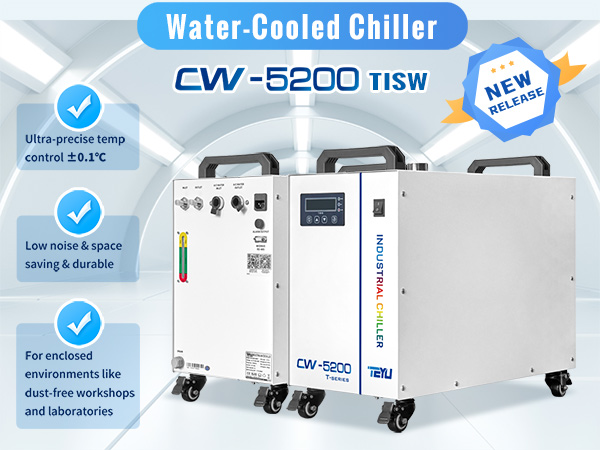MRI apparatining asosiy komponenti supero'tkazuvchi magnit bo'lib, u o'zining yuqori o'tkazuvchanlik holatini saqlab qolish uchun barqaror haroratda ishlashi kerak, bu katta miqdordagi elektr energiyasini iste'mol qilmasdan. Ushbu barqaror haroratni saqlab turish uchun MRI mashinalari sovutish uchun suv sovutgichlariga tayanadi. TEYU S&A suv sovutgichi CW-5200TISW ideal sovutish moslamalaridan biridir.
Nima uchun MRI mashinalariga suv sovutgichlari kerak?
Magnit-rezonans tomografiya (MRI) - tananing ichki tuzilmalarining yuqori aniqlikdagi tasvirlarini taqdim etadigan ilg'or tibbiy tasvirlash texnologiyasi. MRI apparatining asosiy komponenti o'ta o'tkazuvchanlik holatini saqlab turish uchun barqaror haroratda ishlashi kerak bo'lgan o'ta o'tkazuvchan magnitdir. Bu holat magnitga katta miqdorda elektr energiyasini sarflamasdan kuchli magnit maydon hosil qilish imkonini beradi. Ushbu barqaror haroratni saqlab turish uchun MRI mashinalari sovutish uchun suv sovutgichlariga tayanadi.
MRI tizimlari uchun suv sovutgichining asosiy funktsiyalari quyidagilarni o'z ichiga oladi:
1. Supero'tkazuvchi magnitning past haroratini saqlash: Suv sovutgichlari supero'tkazuvchi magnit uchun zarur bo'lgan past haroratli muhitni ta'minlash uchun ultra past haroratli sovutish suvini aylantiradi.
2. Boshqa muhim komponentlarni himoya qilish: Supero'tkazuvchi magnitdan tashqari, MRI mashinasining boshqa qismlari, masalan, gradient sariqlari ham ish paytida hosil bo'lgan issiqlik tufayli sovutishga muhtoj bo'lishi mumkin.
3. Termal shovqinni kamaytirish: sovutish suvining harorati va oqim tezligini nazorat qilish orqali suv sovutgichlari MRI operatsiyalari paytida termal shovqinni kamaytirishga yordam beradi va shu bilan tasvir ravshanligi va piksellar sonini oshiradi.
4. Uskunaning barqaror ishlashini ta'minlash: Yuqori samarali suv sovutgichlari MRI apparatlarining optimal holatida ishlashini ta'minlaydi, uskunaning ishlash muddatini uzaytiradi va shifokorlar uchun aniq diagnostika ma'lumotlarini taqdim etadi.
TEYU Suv sovutgichlari MRI mashinalari uchun ishonchli sovutish echimlarini taklif qiladi
Yuqori aniqlikdagi haroratni nazorat qilish: ± 0,1 ℃ gacha bo'lgan harorat barqarorligi bilan TEYU suv sovutgichlari MRI mashinasining qattiq harorat talablari ostida barqaror ishlashini ta'minlaydi.
Kam shovqinli dizayn: Jim va yopiq tibbiy muhit uchun mos, TEYU suv sovutgichlari shovqinni samarali kamaytirish, bemorlar va xodimlarning bezovtaligini kamaytirish uchun suv bilan sovutilgan issiqlik tarqalishidan foydalanadi.
Intellektual monitoring: Modbus-485 aloqa protokolini qo'llab-quvvatlaydigan TEYU suv sovutgichlari suv haroratini masofadan kuzatish va sozlash imkonini beradi.
Tibbiy asboblar sohasida suv sovutgichlarini qo'llash MRI va boshqa jihozlarning normal ishlashi uchun mustahkam yordam beradi. Haroratni aniq nazorat qilish, samarali sovutish, ishonchlilik va texnik xizmat ko‘rsatish qulayligi kabi xususiyatlar tibbiy asbob-uskunalarning eng yaxshi holatda ishlashini ta’minlaydi va bemorlarga yuqori sifatli tibbiy xizmat ko‘rsatadi. Agar siz MRI apparatlaringiz uchun suv sovutgichlarini qidirsangiz, iltimos, elektron pochta manziliga xat yuboringsales@teyuchiller.com . Biz sizning aniq ehtiyojlaringizni qondiradigan va uskunangizning unumdorligini oshirishga yordam beradigan moslashtirilgan sovutish yechimini taqdim etishga harakat qilamiz.


Sizga kerak bo'lganda biz siz uchun shu yerdamiz.
Biz bilan bog‘lanish uchun shaklni to‘ldiring, biz sizga yordam berishdan xursand bo‘lamiz.










































































































